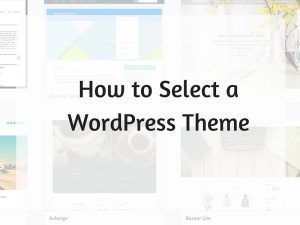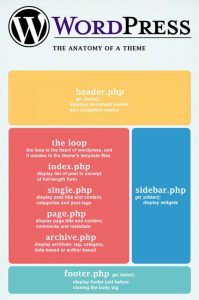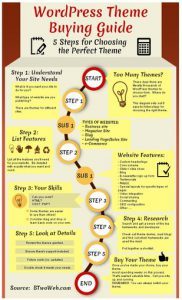 When I created my first WordPress website, my understanding of themes is very much limited to the theory of colors and designs. For me, it’s all about the aesthetic factor and I really thought I got it right. So imagine my disappointment when a fellow blogger commented on my poor selection of theme for my then 9 month old blog.
When I created my first WordPress website, my understanding of themes is very much limited to the theory of colors and designs. For me, it’s all about the aesthetic factor and I really thought I got it right. So imagine my disappointment when a fellow blogger commented on my poor selection of theme for my then 9 month old blog.
“But I thought it looked nice!” was my first argument. “It’s not just about the look,” he clarified. “There’s more.” Really? Here’s what he shared on how to select a good WordPress theme for a website.
(1) What Is the Website All About?
 This is the most basic question that all website owners should ask themselves. What is your purpose of creating a website? Is it a blog site, a business site or a combination of both?
This is the most basic question that all website owners should ask themselves. What is your purpose of creating a website? Is it a blog site, a business site or a combination of both?
You see, a theme used by an art blogger, for example, is likely less suitable for an engineering company’s website. Often times, a blog-based theme can be converted to a business site, but it seldom works well the other way round.
Besides, you should also consider the anatomy of a website and the function of each segment. Is the layout generally clean and easy to navigate? Does it allow you to add image slider, sign up forms or accommodate ads on the sidebar? Some themes are limited when it comes to certain features so research on what you wish to achieve through your website before deciding on a theme.
(2) Is the Theme Compatible?
Apparently, not all themes are a ‘one-size-fit-all’. A theme that looks pretty to you might look very different on another person’s PC. A theme compatibility generally relates to these 3 aspects;
Browser Compliance
Behind every theme design is a set of CSS coding and layout principles that aren’t readily understood by general web-users. These are the technical language used by theme developers to communicate with web browsers. A theme that uses ‘broken codes’ will display incorrectly in certain web browsers and you will require someone with coding experience to fix the error.
WordPress Compliance
Strange, but true. Not all themes build for WordPress will work on WordPress. Themes are written by developers and if they aren’t updated frequently, they usually perform poorly with the latest version of the software.
Search Engine Compliance
All WordPress sites sit on a theme and if the theme isn’t ‘favored’ by search engines (most likely due to the codes – my guess), it might result in poor ranking within the SERPs. Don’t believe me? Do a quick Google Search on whatever topic you like and check out the websites on the latter result pages. They are usually non-updated themes with lots of encryption errors.
This is how a poor performing theme can hurt your online presence in the long run.
(3) Is the Theme Responsive?
Theme responsiveness generally mean, how a website appears on different screen devices, from wide-screen to handheld smartphones.
This feature is becoming increasingly important, especially where user experience is concerned. It has been reported that mobile users close a website within 5 seconds if it fails to show up properly on their devices. Imagine the significant impact it will have on your website traffic! So how do you check if a theme is responsive or not?
1 – A classic method is to minimize by dragging the right corner of your browser and see how the website realigns. If the website automatically adjusts to compliment your viewing, then it is a responsive theme.
2 – Enter the website URL into this online tool and find out how a theme looks like on various screen widths and devices.
When checking for responsiveness, take note that the display can change the orientation and navigation of the web content. These changes will help to make your site more mobile friendly.
(4) Can the Theme Be Customized?
Say, you don’t want a certain widget to appear on the sidebar or don’t like the color of the menu tab. Can you change that? The short answer to this is yes, if the theme allows customization.
Although tweaking HTML and CSS coding isn’t something that most website owners will want to do, it pays to learn a few customization tricks so that your website doesn’t look like everyone else’s. You can always change the appearance and content navigation the way that you wanted.
(5) Does the Theme Provide Technical Support?
 A theme is a digital product that needs maintenance just like any other electronic devices. Having a team of experts that continues to upgrade the codes will ensure the compatibility and responsiveness of the theme as a whole.
A theme is a digital product that needs maintenance just like any other electronic devices. Having a team of experts that continues to upgrade the codes will ensure the compatibility and responsiveness of the theme as a whole.
Besides the common email contact, support should ideally be extended in the form of FAQs, video tutorials and detailed instruction manuals. Generally, premium themes offer better support over free themes.
(6) Are There Any Positive Reviews?
Before using a product, it’s always worthwhile to read some reviews about it first. Start by checking out the developer’s site (if there’s any) to watch some live demos yourself. This will give you a better idea on what to expect when installing the theme.
When reading positive customer reviews, don’t just look for glossy comments. Look out for constructive comments that offers an insight on how errors are moderated between the developer and the users. This will reflect the quality of the overall theme support.
For example, premium themes like Genesis are very popular among bloggers and online business owners when it comes to creating a WordPress website.
The Best WordPress Theme Is …
As I found out, has a lot to do with functions than appearance. A good theme simply makes a website perform better in terms of user experience and search ranking.
If all this sound too complicated for you, don’t worry. Just start with a basic theme and go from there. As your content becomes more developed, you’ll gradually come to learn which theme suits your niche the most. Just remember to do content backups before you change to a new theme.
Interested to experiment with different WordPress theme? Simply create a website using SiteRubix to learn more.
Do you have any thoughts or questions about this topic? Feel free to leave your comment below and I’ll get back to you.

Cathy,
I want to thank you for talking some sense about themes. When I first started, I was blown away by all the different looks, and I was approaching it all wrong. As you mention the real key is to have a responsive multi-functional theme that works well with search engines, mobile devices and offers you control.
Hi Gary,
Themes can really be deceiving in that sense. I think that’s because a lot of beginners do not understand the anatomy of a website in the first place. If you know how each component influence the reader’s experience and search engine visibility, you’ll be able to better appreciate the difference between a ‘good’ and a ‘bad’ theme.
Great advice Cathy. I tested my theme with the tool. Looks quite good. I will keep an eye out for that thought and I believe at some point I will want to invest in a book to learn about basic website coding. It can’t hurt, right?
Hi Sarah,
Most WordPress theme are quite user friendly so there isn’t really much coding to learn actually. If you are referring to HTML codes, that’s different and yes, it pays to understand a few basics so you don’t have to install too many plugins on your site.
Styling a theme is another topic altogether and it’s entirely optional. If you are up for the challenge, you can try build a site using Genesis.
Hi Cathy,
Choosing a theme for a website is not easy. There’s just so much choice with both free and paid themes. In your post you give us some good pointers and suggestions. After a lot of searching, I decided to choose a premium theme. Sure it takes a little getting used to in the beginning, but if I run into any problems, the support is there. By the way, I really like your theme, Cathy.
Thank you Peter.
The theme that I am using is called Genesis. It is user friendly and has a lot of resources from StudioPress as well as from independent bloggers. They have a great team working around the clock to maintain Genesis so it gives me the reassurance that my website will not only look pretty, but also function properly on the web.
Great post Cathy!
Choosing the right theme is not as easy as it looks. I am fairly happy with the theme that I use, but sometimes when I visit other peoples blogs, I love their themes and always wonder which one they are using. I did change mine once but quickly changed back as I didn’t like it.
Yours looks great by the way, which one do you use?
Hi John,
Once you understand the anatomy of a website, you’ll be more familiar with the various theme layouts out there. Instead of following other people, it is more important that we know what kind of style suits our niche best. So if you are happy with what your theme delivers, stick with it.
I used to use a free theme, but after some feedback, I decided to use Genesis and have been quite happy with it so far 🙂
Yes I have heard about Genesis before, I will definitely check it out!
Hi Cathy!
I’m thoroughly impressed by the knowledge you’ve written on choosing a theme here. I like how you don’t limit the possibilities to your readers and instead provide a very worthy guideline on what to follow as you go about choosing a theme most relevant to your topic and niche.
This isn’t an easy post to write nor explain, yet you have done an amazing job! I know the importance of picking the right theme myself, as I have gone through one too many before picking one that would be both SEO optimized and easy to navigate.
Great to hear from you again, Peter.
All niche bloggers have to start from somewhere and what I wanted to point out is that it’s really okay to begin with a basic theme. I don’t recommend anyone to spend days mulling over which theme to use. As you create more quality content, it will start to make sense where you want your readers to go. It will give you a better idea on what kind of web layout and functions to use and eventually, which theme you should upgrade to.
This article is not the easiest to write without sounding too bias. I started blogging with a basic theme that helped me familiarize with WordPress before I felt comfortable moving onto a new theme which is more suited to the purpose of my website. I have benefited from both experiences and I think it’s worth sharing the information with the readers.
I have seen people drive themselves crazy trying to find the “perfect” theme which doesn’t exist. I like to start simple and add aesthetically pleasing elements as I go along. I don’t go crazy with it though.
People visit your site for information and that should be the focus of your site (in most cases). I eventually started using a premium WordPress theme. Not for bells and whistles, but for functionality that saves time.
You are absolutely right, Steve.
Without any relevant web content, it is really hard to appreciate the function of a theme. Therefore, I would recommend to always start with a free theme, add some depth through content creation and navigate from the user’s perspective. If you like how your information flow, then you have found yourself a great theme.
Thank you for this post Cathy, especially the site that checks how your site looks at different resolutions!
I struggled for days over Theme choice simply because there are so many out there and even now I’m not sure that I have chosen one that I’m completely happy with. However, it does meet some of the criteria that you mentioned, so overall it’s not too bad.
I can’t say enough how frustrating it is to pick a low-grade theme only to realize that it’s full of bugs and bits and pieces that don’t work as they should. Guess that just comes along with WordPress being an open-source platform.
Oh yes, Jolie.
Free theme does have its danger in that sense. As in my case, I was quite happy with my free theme until I got an insider information that the developer has no intention to upgrade the codes moving forward. Knowing that WordPress is always changing, the news made me nervous and I wasted no time in changing to Genesis immediately after that.
Hi Cathy,
I’ve bookmarked your site as I’ve been constantly back and forth contemplating changing my theme over and over. Maybe I’m tired seeing it, maybe it’s the perfectionist in me I don’t know.
I’m taking the tips you have here into consideration before I make a decision I might regret, thanks for sharing.
Hey Ty,
Don’t stress out yourself finding ‘that’ perfect theme. Start with a simple basic theme and come up with good quality content to get your website indexed first. When you read more blogs, you’ll identify what you need and what feature you don’t like. As long as you have a backup copy, WordPress theme is always interchangeable with a few simple clicks. So no worries.